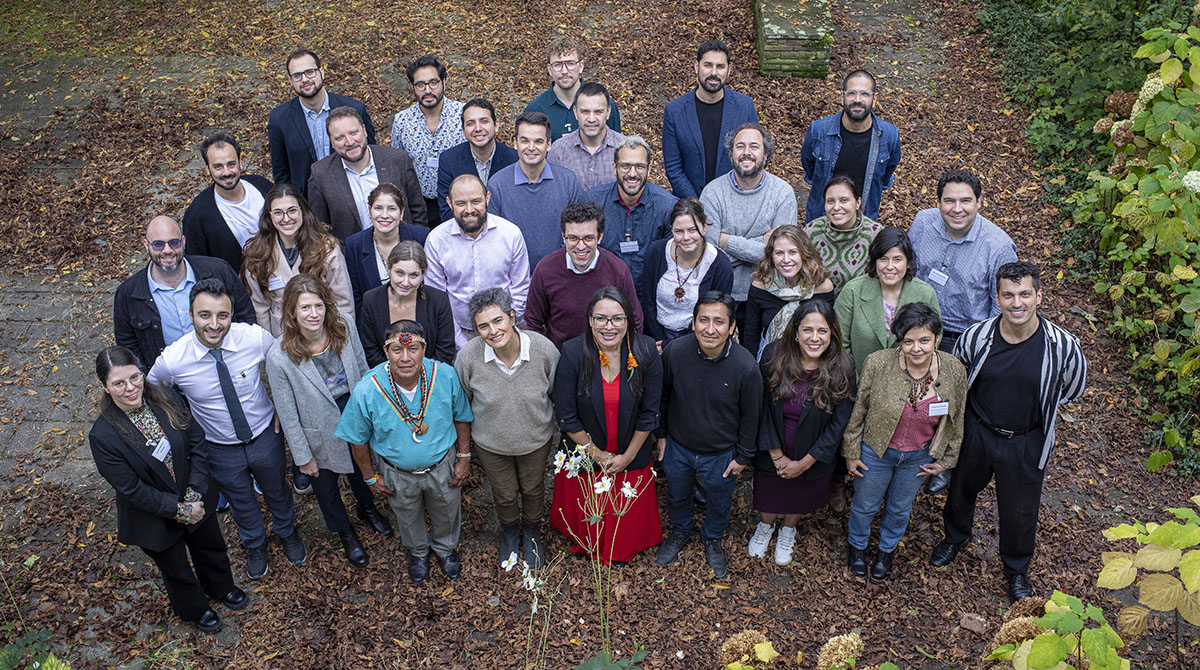Forum Latin America—an Initiative within the Max Planck Law network—recently hosted the interdisciplinary conference ‘The Law & the Amazon: Challenges for a Sustainable Future’. Held on 17–18 October 2024 at the Max Planck Institute for the Study of Crime, Security and Law , the conference convened researchers across disciplines and civil society representatives to address the critical challenges facing the Amazon region as the heart of Latin America.
Professor Thomas Duve, Director of the Max Planck Institute for Legal History and Legal Theory, opened the conference alongside the Forum Latin America team, representing five Max Planck Law network Institutes: Linus Ensel (MPI-Freiburg), Jenny García Ruales (MPI-Halle, Amazon of Rights Project), Germán Johannsen (MPI-Munich | Innovation, Humanet3), Bruno Lima (MPI-Frankfurt), and Roberto Ramos Obando (MPI-Munich | Tax Law).
Samara Pataxó, Chief Advisor for Inclusion and Diversity at the Brazilian Superior Electoral Court, delivered the keynote address. As an Indigenous leader and legal expert, Samara presented a powerful reflection on the law as a tool to amplify the voices of those who ‘hold up the sky’. She also invited us to ‘aldear o direito’ [inhabit the law] and ‘reflorestar as mentes’ [reforest the minds] through joint research, to thus ‘aldear os espaços’ [inhabit the spaces] in which we navigate as academics, legal practitioners, and civil society members to reconfigure our care for the Amazons and the planetary importance of all its inhabitants.
After a successful call for papers that attracted wide interest and nearly 100 submissions, over 35 participants from over 11 nationalities and diverse academic backgrounds travelled to Freiburg from around the world. Over two days of intensive debate, a wide range of issues critical to the Amazon were covered (download conference programme).
Beginning with a discussion on new methodological approaches and critical reflections on socio-legal dynamics within the Amazon, topics evolved to include the intersection of international law and climate change, the rights of nature, Indigenous rights, environmental crime and litigation, and the potential for a sustainable market economy in the Amazon and Latin America.
The conference offered an invaluable platform for researchers from Latin America and showed how relevant studies on the region are taking place in universities and think tanks across the world, such as Australia, the United States, and many European countries. A key takeaway was the urgent need for more spaces like the one offered by Forum Latin America over these two days, to facilitate academic perspectives on the region’s challenges.
To give continuity to the work initiated at this conference, selected papers will be considered for publication in a bilingual special issue of the journal ‘Latin American Legal Studies’, to be published next year. In this way, we seek to encourage not only academic discussion within four walls, but also and especially the widest possible dissemination of the ideas and perspectives that have been discussed along the conference.
Forum Latin America aspires to cultivate a Latin American voice within legal academia—one that moves beyond mere legal transplants and instead emphasizes ‘injertos jurídicos’ [legal grafts] that grow from within the region’s own context. This vision involves a sustained commitment to local laws, epistemologies, and the individuals shaping and reimagining justice and knowledge in Latin America. With this enthusiasm, we—the Forum and the Max Planck Law network—extend our thanks to all participants and collaborators. This event marks an important step in fostering sustained horizontal research and interdisciplinary cooperation on one of the most critical legal and environmental challenges of our time.
Linus Ensel
Jenny García Ruales
Germán Oscar Johannsen
Bruno Lima
Roberto Ramos Obando
